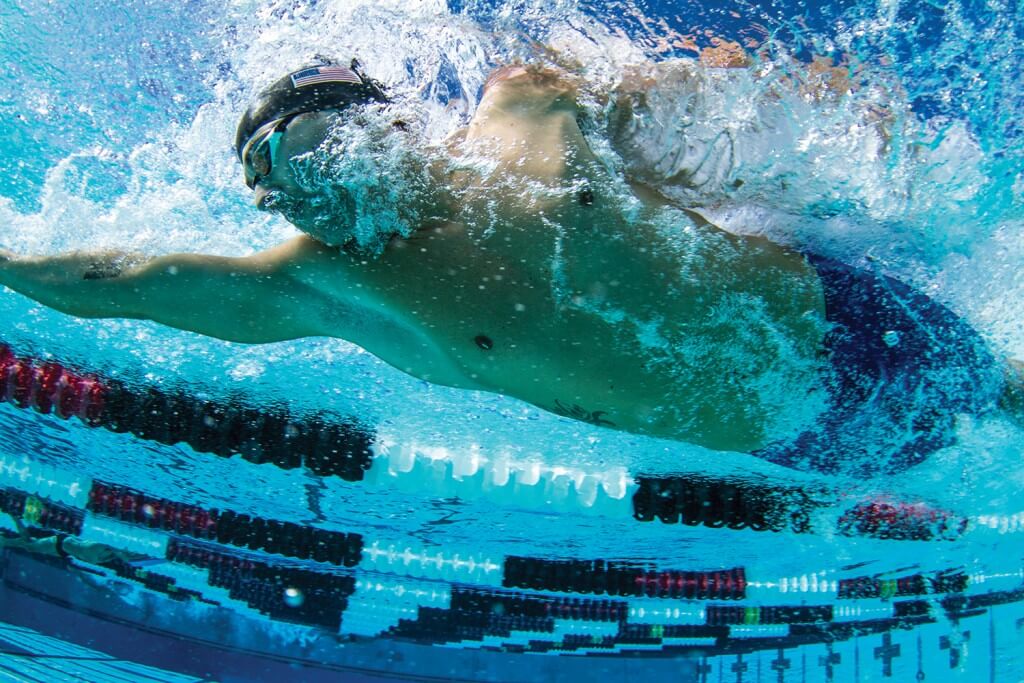Tucker Dupree: Through the Eyes of a Champion

By Cristian Corbett, Swimming World College Intern
Phelps, Lochte, Adrian, Dupree. All last names of swimming greats that any swimming fanatic would recognize. Does one look unfamiliar? It shouldn’t. Tucker Dupree is a three-time medalist from the 2012 Paralympic Games, holds two world records, nine Pan-American records and 43 American records. He is also an elite ambassador for Lululemon Athletica, and a Dolfin Pro swimmer. So what makes Tucker worthy of being listed among the greatest swimmers of our time? Tucker completed all of those feats without being able to see.
Growing up, Tucker was what he described as a “normal kid.” Raised in Raleigh, North Carolina, Tucker played soccer and basketball until the age of 15 and didn’t take up swimming until later in his high school career.
“I picked swimming by accident,” said Tucker. “My sister was a swimmer her senior year of high school, and I would sit in the bleachers and just hang out, and the coach said, ‘you’re here every day, you might as well get in.’ I tried it out and I was awful. But I went from being the worst swimmer on the team my sophomore year of high school to becoming team captain and breaking school records my senior year.”
During his senior year, Tucker was given the opportunity to swim in college. After going on recruiting trips to several schools in North Carolina, Tucker was about to make his decision when his life changed forever.
“I woke up one day during my senior year and I couldn’t see out of my left eye. Within four months I went 80 percent blind in both of my eyes.”
Tucker was diagnosed with a rare condition called Leber’s hereditary optic neropathy (LHON). Given the rarity of Tucker’s condition, predicting what would happen to him later was something the doctors had a hard time with.
“It was a very unknown thing because nobody in my family had had this disease. I did about two and a half months of testing. At the time, I was very proactive about it because I didn’t think it was too big of a deal and that I would take care of it later, but I had to relearn how to do things like crossing the street and pouring a glass of water with the vision that I had left.”
He then attended a blind school in North Carolina to help him finish the rest of his high school education and to become independent and learn to live without most of his vision.
“It didn’t really hit me until the day that I had to give up my driver’s license, and I will forever remember that day. I wasn’t able to see the stoplight right outside my neighborhood, but I was able to safely get to my house. I put the car in park, I pulled out my driver’s license, took the keys out of the ignition, and it was the last time I was able to sit in the driver’s seat. It was definitely the pinnacle moment of acceptance.”
After this, Tucker was introduced to another athlete that brought up the idea of competing in Paralympic sport. The Paralympic Games are the second largest sporting event in the world, and athletes compete in the exact same venues as the Olympic Games, just a few weeks later.
Tucker competed in his first Paralympic swim meet in 2007 and broke five American records, five Pan-American records and was given a spot on the U.S. Paralympics National Team. At the time, Tucker was also the fastest blind swimmer that the United States had seen in over 20 years.
Tucker continued to go on and compete in the 2008 Beijing Paralympic Games. He didn’t win any medals, but that only motivated him to work harder for the next Games.
“I finished fourth, fifth twice, sixth twice and seventh. I think not winning any medals was actually a good stepping stone for my career, it lit the fire for me for the next four years.”
In preparation for London, Tucker got to travel the world, breaking world records in the 50 and 100 meter butterfly in the process. He also made the podium at every single international meet that he competed in.
At the London Games in 2012, Tucker swam a whopping five events.
“I swam a huge program in London. For a sprinter, five events was a lot for me. I swam the 400 free, 100 fly, 50 free, 100 free, and 100 back.”
Tucker didn’t win any medals in the 400 free or the 100 fly, in which he was a world record holder, but he managed to win his very first Paralympic medal in the 100 free, taking third and earning a bronze medal.
After that, Tucker won a silver medal in the 100 back and another bronze in the 50 free.
After a successful Games, Tucker considered calling it quits.
“I thought to myself, ‘Maybe that’s enough, maybe that’s it,’ but my coach told me, ‘You’ve got to go out on top,’ and I signed up for four more years.”
Tucker continued to train and is now gearing up for a third outing in the Paralympic Games this September.
“When people are faced with adversity, I think that a lot of people get restraints put on them by others and by themselves. Having the ability to redefine your limitations and say ‘this is not going to be my identity, I’m going to go and do great things,’ when you’re faced with adversity and it’s all channeled through limitless vision. I am able to do more without vision than I ever would have ever dreamed of doing with it.”




Inspiring story. Just what I needed today to feed my soul.